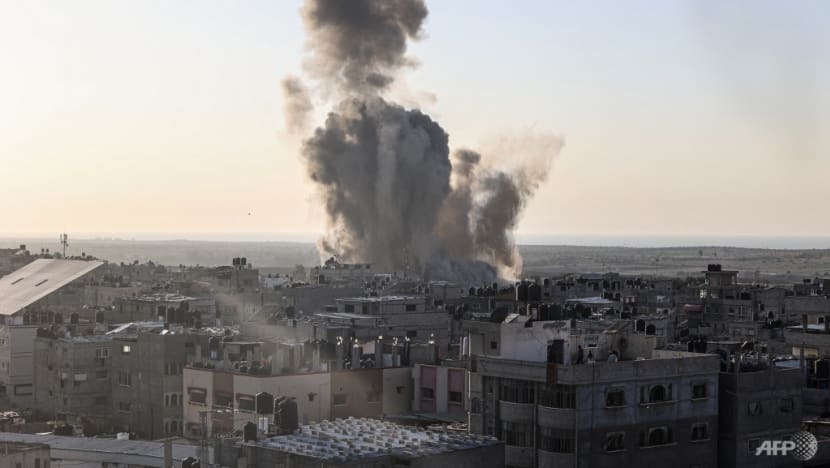Commentary: America, Iran and the threat of a wider war in the Middle East
None of the Middle East’s big powers wants further conflict but it could happen nonetheless, says the Financial Times' Gideon Rachman.

Smoke and dust rise following an Israeli air strike in Rafah, in the southern Gaza Strip on Oct 30, 2023, amid the ongoing battles between Israel and the Palestinian group Hamas. (Photo: AFP/ Said Khatib)

This audio is generated by an AI tool.
LONDON: Historians are fascinated by the outbreak of the first world war. How could the assassination of an Austrian archduke in Sarajevo in June 1914 have led, just a few weeks later, to a conflict that dragged in every major power in Europe, and eventually the US?
The question is particularly troubling because many of the leaders involved tried hard to avoid a general European war. The German and Russian emperors exchanged numerous messages trying to defuse the month-long crisis that led to conflict. But they failed.
A similar danger of inadvertent escalation now hangs over the Middle East. The horrors of the Gaza conflict are so compelling that it is tempting just to concentrate on the fighting there. But Western policymakers are increasingly focused on the wider region - and the danger of a general war in the Middle East that could pull in Iran, the US and even Saudi Arabia.
For the Biden administration, that threat of a wider war is now regarded as the central challenge in the entire crisis. As one Washington insider puts it: “All the countries involved have thresholds that, if crossed, will make them believe they have to act. But nobody really knows what the other side’s threshold is.”
WHERE'S THE RED LINE?
Over the weekend, Iran issued a clear threat that its own threshold is getting closer. Ebrahim Raisi, the country’s president, took to X (formerly Twitter) to state that Israel’s actions in Gaza have “crossed the red lines, and this may force everyone to take action.” He added: “Washington asks us to not do anything, but they keep giving widespread support to Israel.”
So how could escalation play out? One indication came last week, when the US bombed Iran-backed militias in Syria. Washington said that it was responding to attacks on US forces in Iraq and Syria, carried out by Iranian proxies. If those attacks continue, and American troops are killed, the next US response will be even fiercer.
The role of Hezbollah, the Iran-backed militant group based in Lebanon, is crucial. If Hezbollah steps up its attacks on Israel, it has enough precision-guided missiles in its armoury to essentially force most of the civilian population of Israel into bomb shelters.
Benjamin Netanyahu, Israel’s prime minister, has threatened Lebanon with “devastation”, if Israel is attacked from its territory. But if Hezbollah is in danger of destruction, Iran could send in troops from the Islamic Revolutionary Guard Corps to fight alongside its ally. At that point, Israel might decide to strike the IRGC in Iran, as well as in Lebanon.
Other Iranian proxies around the region would also probably respond to a war involving Hezbollah, by stepping up their attacks on Israeli and American targets. Iran might also finally act on its occasional threats to close the Strait of Hormuz, through which much of the world’s oil flows - perhaps by mining the strait. That would send the global economy into a tailspin and also directly threaten Saudi Arabia.
The US Navy would attempt to reopen the strait. But that might lead Iran and its proxies to hit back. The US has troops and facilities all over the region that could be targeted - including in Bahrain, the United Arab Emirates, Qatar, Syria and Iraq.
RISK OF A REGIONAL WAR
One Iran-backed force that the Americans are watching with particular concern are the Houthis in Yemen - who were targeted in a brutal war with Saudi Arabia. Houthi forces fired rockets towards Israel last week. They have also hit Saudi oil facilities in the past. A few precision missiles could destroy the desalination plants that supply water to the Saudi capital, Riyadh.
A conflict that unfolded in this way would be a disaster for every one of the participants - and they all know it. It could happen nonetheless because all sides also believe that there are certain events that it would be very dangerous for them not to respond to.
Israel has invaded Gaza, without a credible exit plan, because it feels it must “restore deterrence”. Iran believes that it has to show that its “axis of resistance” is supporting the Palestinians. America believes that it must respond forcefully to any attacks on its troops.
Not everybody in the region is panicking. In Riyadh last week, I found some well-placed Saudis asserting confidently that this was just another crisis in a historically unstable region. The kingdom’s ambitious modernisation agenda - Vision 2030 - remained on track, they insisted.
But the business-as-usual crowd in Riyadh are burying their heads in the sand. Crown Prince Mohammed bin Salman, the country’s de facto ruler, is very worried about the risk of a regional war. MBS’s strategy, says one confidant, is to “put pressure on the Americans to put pressure on the Israelis”. The Americans, for their part, hope that MBS, Qatar and even China can persuade Iran of the dangers of escalation and the need for restraint.
This crisis has already led to an unprecedented conversation between MBS and the president of Iran. Like the Russian and German emperors before the first world war, the Iranian and Saudi leaders were willing to talk to each other - in a bid to avoid a catastrophic war. It did not work in 1914. Let us hope this time is different.
















